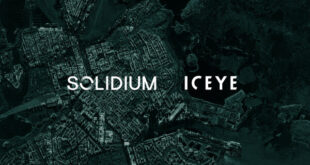
The Russian government has stated that it will not allow OneWeb, the U.S. satellite communications start-up building a 900-satellite megaconstellation, to provide satellite broadband Internet in Russia, citing national security concerns that the company might provide access to an open Internet that is out Moscow’s control.
This statement comes despite the fact that Roscosmos, the Russian state space agency, has a contract worth U.S.$1 billion to launch OneWeb satellites, and it complicates a joint venture between OneWeb and state-owned Russian satellite operator Gonets.
OneWeb plans to use a constellation of hundreds of satellites to provide a worldwide Internet network. It secured the deal with Roscosmos in 2015 to launch its satellites, and also then signed a joint venture with Gonets to service Russia.
However, because of these objections from Russia, Business Insider reports that OneWeb is relinquishing its majority stake in the joint venture, according to two industry sources and a Russian state procurement document.
OneWeb currently holds a 60 percent stake in the project and Gonets has a 40 percent stake. Business Insider reports that Gonets now plans to increase its stake to 51 percent, and it is looking for a contractor to estimate the cost of the deal, according to a document submitted by Gonets in the Russian state procurement system.
Business Insider also reports that two Russian government sources – one at the FSB (the Russian Federal Security Service), and the other an official at the Ministry for Digital Development and Communication – confirmed to Reuters that Gonets would become a controlling stakeholder in the joint venture with OneWeb.
This is a key condition for OneWeb operating in Russia, although there are other conditions as well, according to the tryout.
“OneWeb is an important project for Roscosmos and Russia’s space industry, but national security issues come first. There are many doubts regarding that project, especially because of the sanctions against us,” said the source at the FSB to Business Insider.
Speaking at a conference in Moscow, Federal Security Service official Vladimir Sadovnikov said the FSB was against the project servicing Russia for security reasons since it could potentially hand a foreign Internet service provider a monopoly over rural and remote areas.
“Some of Russia’s regions would become totally dependent on a foreign satellite service,” Sadovnikov said, adding that Moscow had not received any conclusive evidence that OneWeb’s satellites would not be used for intelligence gathering.
“The only way to address the threats of foreign satellite networks like OneWeb, especially in the Arctic region and Far North, is to restrict their usage in Russia,” Sadovnikov said.
He added that Russia favored setting up a similar network partnering with India, China, and countries which he described as “non-aggressive.”
OneWeb submitted a request to receive a frequency band in Russia, but was refused by authorities, according to Russian media reports confirmed by a communications official. A source at the Ministry for Digital Development and Communications said OneWeb would be given permission after legal issues regarding the joint venture were completed.
OneWeb aims to make internet access available to everyone, including travelers on aircraft and high-speed transport. Its project is meant to be fully online by 2027. It plans to create a network of 900 satellites, most of which will be sent into orbit by 21 Soyuz launch vehicles from the Baikonur Cosmodrome in Kazakhstan and the Guiana Space Centre in French Guiana.
The Russian government hold on OneWeb’s operations in Russia comes as Moscow tightens its control over internet access in the country, as well as assert its concept of national sovereignty in cyberspace within Russian borders and its near-abroad.
“Russian authorities have in the past several years adapted to the evolution of cyberspace by taking a number of policy steps to ensure their policies give them complete jurisdiction in cyber activities taking place in their geographical boundaries,” said Gregory Gleason in an essay on Russian cyberspace policy for The Jamestown Foundation.
“…Russian authorities have regarded the rapid evolution of cyberspace as a serious threat to the Russian state and Moscow’s interpretation of national sovereignty,” Gleason adds.
“The government has acted in recent years to impose territorial conceptions of national sovereignty in the form of policies designed to establish “digital sovereignty” in cyberspace. The authorities also want to ensure that Russia’s self-identified “sphere of influence” will coincide with a cyber-sphere of influence beyond its national borders so as to include traditional Russian imperial and Soviet-era borderlands (the “near abroad”),” Gleason notes.
 SpaceWatch.Global An independent perspective on space
SpaceWatch.Global An independent perspective on space




